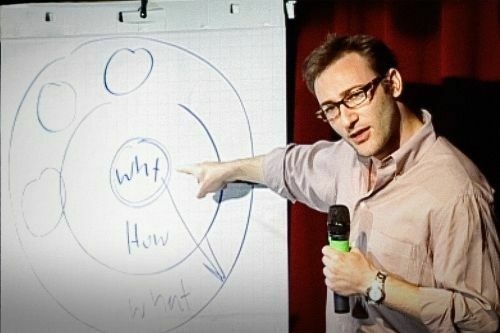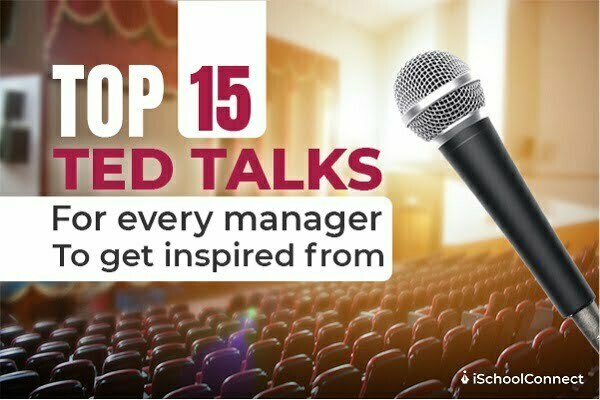Table of Contents
- TED Talks for managers | An overview
- Simon Sinek – How Great Leaders Inspire Action
- Steve Jobs – How to Live Before You Die
- Patti Dobrowolski – Draw Your Future
- Richard St. John – 8 Secrets of Success
- Susan Cain – The Power of Introverts
- Shawn Achor – The Happy Secret to Better Work
- Tony Robbins – Why We Do What We Do
- Amy Cuddy – Your Body Language Shapes Who You Are
- Jason Fried – Why Work Doesn’t Happen at Work
- Tom Wujec – Build a Tower, Build a Team
- Itay Talgum – Lead Like the Great Conductors
- Dan Ariely – What Makes Us Feel Good About Our Work?
- Carol Dweck – The Power of Believing You Can Improve
- Margaret Heffernan – Dare to Disagree
- Dan Pink – The Puzzle of Motivation
- Key takeaways
- FAQs
TED Talks for managers | An overview
Becoming a manager means learning a whole new set of skills. This learning is an ongoing journey, likely for the rest of your career as you face new challenges and opportunities. There are inspirational TED Talks for managers that will speak to you and transform the way you operate, no matter what industry you are in.
If you’re keen on learning more about the latest developments in performance management, TED Talks may provide you with various fresh ideas.
Simon Sinek – How Great Leaders Inspire Action

Author Simon Sinek tells how his own attempt to understand personal motivation led him to the fundamental understanding that it all starts with ‘why.’ The finest managers and leaders help employees relate their own aspirations to the company’s or organization’s mission. The statement “People will work for your money if you hire them just because they can do a job. However, if you recruit people who share your beliefs, they will work tirelessly for you,” truly hit the right chords.
Steve Jobs – How to Live Before You Die
Steve Jobs gave one of the best TED Talks for managers. He recounts his university experience and provides critical performance management lessons in his renowned TED Talk, ‘How To Live Before You Die.’ Jobs talks about dropping out of college and then getting in again, taking just classes that excite and interest him. Following his ambitions, Jobs mastered calligraphy and went on to develop Apple, a computer system noted for its exquisite typography.
In terms of performance, employee development and creativity are crucial. It is impossible to predict which lessons will be useful in the future. Rather than forcing employees to maintain an unwavering focus on business objectives, we must give them the freedom to challenge themselves and learn about different topics. Remember, the only way for your employees to be content is for them to enjoy what they do and be able to use their talents.
Patti Dobrowolski – Draw Your Future
New managers might be afraid and don’t want to upset their coworkers, colleagues, or management. In her Ted Talk, Patti Dobrowolski discusses how sketching may lead to the invention. Her approach syncs with neurobiology which leverages the power of thought to generate a future vision. Managers may use this to reinvent themselves, their teams, and their companies.
The odds are generally against us when it comes to transformation. Research has revealed that when it comes to implementing meaningful changes, we typically face 9 to 1 odds. Dobrowolski claims that we begin to believe when we visualize our chosen future. We can train and implement our goal to the maximum extent once we believe in it.
Richard St. John – 8 Secrets of Success
Fourth on the list of some amazing TED talks for managers is of Richard St. John’s. He embarked on a ten-year quest to uncover the secrets of success by interviewing and researching the world’s most successful individuals. St. John consolidates what he learned into eight simple phrases in this three-minute presentation. “The fascinating thing is that if you do it for the love of it, the money will come.”
Susan Cain – The Power of Introverts
Susan Cain, a former corporate lawyer and negotiating consultant, explains the often underappreciated advantages that introverted individuals offer to the business and the world in her book ‘Quiet: The Power of Introverts.’ Cain demonstrates how introverts have been some of the world’s greatest leaders and how their particular talents and abilities may be exploited in the workplace, exposing our culture’s extrovert bias. “There is no link between being the best talker and having the finest ideas,” Cain points out.
Shawn Achor – The Happy Secret to Better Work

Shawn Achor, a well-known Harvard professor and the CEO of GoodThink Inc., questions the age-old premise that people work to be happy, arguing that pleasure makes one more productive. In this extremely humorous and uplifting talk, Achor shows how organizations may boost employee satisfaction and purpose and increase success rates and profitability.
Tony Robbins – Why We Do What We Do
Tony Robbins, a well-known life coach and motivational speaker, discusses why he prefers to help people understand why they do what they do and the ‘invisible forces’ that drive their behavior rather than encouraging them. In his distinct tell-it-like-it-is style, Robbins argues that our emotions are the true seat of our actions, and he helps us connect with the true origins of our drive.
Amy Cuddy – Your Body Language Shapes Who You Are
Amy Cuddy, a Harvard Business School researcher and lecturer, illustrates how our body language talks to us as well as to others. Cuddy’s research on ‘power posing’ shows that the way we sit or our posture may have a favorable or bad impact on our self-confidence, persuasiveness, and chances of success. She says, “Our bodies influence our thoughts, and our minds influence our conduct, which influences our results.”
Jason Fried – Why Work Doesn’t Happen at Work
According to Jason Fried, author of the blockbuster business book ‘Rework’ and co-founder of 37-signals, the greatest hurdles to productivity are ‘M&Ms,’ or Managers and Meetings. Fried believes that the workplace is one of the worst locations to try to get work done, and he proposes three alternatives to the status quo to boost your team’s productivity.
Tom Wujec – Build a Tower, Build a Team
Your objective as a manager is to assemble the greatest team possible and maximize their performance. In this session, Autodesk member Tom Wujec looks at what we can learn about teamwork and productivity from the ‘marshmallow issue,’ a basic team-building activity that involves combining dried spaghetti, tape, and a marshmallow to determine who can construct the highest tower. “Design is a physical activity. It necessitates that we engage all of our senses and offer our best thinking, feeling, and acting to the work at hand.”
Itay Talgum – Lead Like the Great Conductors
On the premise that leading and managing people is similar to conducting an orchestra, Israeli conductor Itay Talgam examines the methods of six of the best conductors of the twentieth century for tips on how to get the most out of any cooperation. Learn how to create a successful company by learning how to listen and react properly. He says, “The satisfaction of a conductor stems from more than just their narrative and love of music. It brings me delight to be able to hear other people’s tales at the same time.”
Dan Ariely – What Makes Us Feel Good About Our Work?
Dan Ariely is a world-renowned researcher in the field of behavioral economics. He’s published several best-selling books, including ‘Predictably Irrational,’ to explain how humans act in real life. Ariely explains essential motivators for individuals to perform their professions in this TED lecture.
Here, meaning is the primary fundamental. People require motivation to do their tasks. Everyone needs recognition. The lack of recognition can lead to frustration and low morale. Last but not least, there is a requirement for ownership. People respect their effort more. This is where he demonstrates why Ikea is a fantastic furniture firm in his TED Talk.
Carol Dweck – The Power of Believing You Can Improve
Carol Dweck is a Stanford University psychology professor. Her book, Mindset, is fantastic, and this talk is an excellent distillation of many of the principles she discusses in it. Understanding what it means to have a growth mindset is crucial. It implies accepting the fact that all talents can be learned. “Wow, you’re brilliant,” or “wow, you’re a natural,” are not compliments. Instead, you want to recognize and encourage individuals for their hard work and the desire to learn new things that we all possess.
As a manager, this involves encouraging your employees to learn and grow. Work to eliminate the phrase “I’m not good at it.” If that’s the case, engage with them to figure out how to improve rather than ignore the flaw. A team with a growth attitude is unstoppable because they will roll up their sleeves and figure out how to conquer any challenge.
Margaret Heffernan – Dare to Disagree
Every manager’s weekly to-do list includes resolving workplace disagreements. Margaret Heffernan, a CEO, and entrepreneur believes that healthy debate is valuable. Excellent teams, she believes, are not echo chambers but places where individuals are encouraged to disagree regularly. Plus, Margaret Heffernan’s ‘Willful Blindness’ is a must-read if you haven’t already. It investigates why companies frequently overlook the obvious only to fail in the face of dire repercussions.
Dan Pink – The Puzzle of Motivation
Dan Pink, a former Al Gore speechwriter and career analyst, adds humor and interesting anecdotes to the motivation puzzle, revealing new methods of tackling the managerial challenge. She says, “Aren’t you supposed to reward those who do better? Bonuses, commissions, and their reality show are all on the table. Encourage them to participate. But that isn’t the case here. You have an incentive that should sharpen thinking and increase creativity, but it accomplishes the opposite. It stifles innovation and dulls thinking.”
Key takeaways
- Great leaders motivate and honestly lead their employees to achieve a common goal.
- Leadership development is a lifelong endeavor. TED Talks for managers, like the ones included in this blog, may be an effective approach to help managers transition into their leadership roles.
- Ted Talks can also help managers come up with new ideas to lead a team or work towards employee happiness.
So, which one of these TED Talks for managers are you going to watch first? Tell us in the comments below! If you have any questions/suggestions, you can also reach out to us.
Liked this blog? Read next: Must-watch TED Talks for entrepreneurs
FAQs
Q1. What exactly are TED Talks?
Answer – A TED Talk is a video recording of a public-speaking presentation delivered at the main TED (technology, entertainment, and design) yearly event or one of its numerous satellite events across the world. TED is a non-profit organization dedicated to promoting ideas through short, motivational speeches or lectures known as “TED Talks.”
Q2. What are the differences between TEDx and TED Talks?
Answer – The only decision to make is which to watch first, prompting many newcomers to wonder, “What’s the difference between TED and TEDx Talks?” TED Presentations are intended for a worldwide audience, whereas TEDx talks are intended for a smaller, local audience.
Q3. What characteristics distinguish an excellent TED talk speaker?
Answer – TED speakers who succeed are those who live and breathe their message. They’ve seen personally the power of the concepts they’re promoting, and they’re confident that their speech will transform people.






